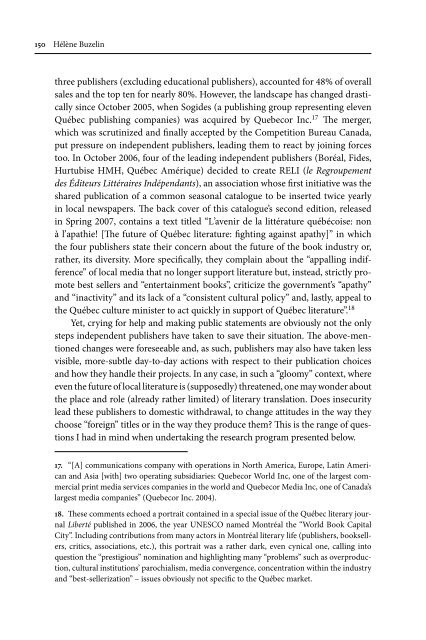<strong>Translation</strong>s “in the making” 19foreign agents in search <strong>of</strong> a French-language publisher. This, in addition to thisfield’s recent development, explains why part <strong>of</strong> the national literary canon andbest-selling authors such as Leonard Cohen, Mordecai Richler, Margaret Atwoodand Michael Ondaatje have generally been translated and published in France,though this trend has been changing over the past ten years. Throughout the pastforty years, translations have accounted for a limited but increasing percentage<strong>of</strong> the overall number <strong>of</strong> made-in-Québec publications, up from 7% in 1968 to16,2% in 2005 – or more than 20% if we consider commercial publishing only,which seems to have been the principal motor <strong>of</strong> this activity. 15On the whole, in polysystemic terms, Québec appears as a hybrid context thatis at once weak (in terms <strong>of</strong> size) and strong, or at least mainstream (in terms <strong>of</strong>language). It has its own literary institutions (hence, it constitutes a proper literaryfield in the Bourdieusian sense), as well as all the agents and economic channelsrequired for a sustainable book industry (from literary agencies to literary magazinesto publishers, distributors, bookstores, etc.). As such, Québec cannot beseen simply as a parcel <strong>of</strong> the French and Canadian book industries. Rather, it isa specific market/industry operating primarily at the crossroads <strong>of</strong>, and informedby, the European French and English-Canadian ones.On a per capita basis, this industry, which developed quickly and recently,now compares with its counterpart in France regarding the diversity <strong>of</strong> titles <strong>of</strong>fered.Since 1994, however, it has gone through a period <strong>of</strong> stagnation. Accordingto a report by the Observatoire de la culture et des communications au Québecpublished in 2004, the market attained saturation (demonstrating difficulty in absorbingnew titles), and the situation in the publishing sector has been decliningfor the past ten years as companies have posted reduced sales, revenues and pr<strong>of</strong>itmargins. The report concluded that in such a context, governmental support wasmore necessary than ever (p. 117), while mentioning that the publishing-assistancepolicy also reached its limits. 16 In terms <strong>of</strong> structure, the level <strong>of</strong> (horizontal)concentration among publishers compared, in 2004, to that prevailing in Francein 1998, before the acquisition <strong>of</strong> Vivendi Universal by Lagardère: i.e. the top15. Indeed, whereas in 1975 only 10% <strong>of</strong> published translations were produced by commercialeditors, today the figure is close to 95%, while commercial publishing accounts for only aslightly increased percentage with regard to editorial activity as a whole.1. An analysis <strong>of</strong> Québec publishers’ financial reports revealed a positive relationship between“la croissance des subventions et celles des ventes de livres, [ce qui] signifie que les fonds injectésdans l’édition de livres permettent effectivement aux éditeurs de faire connaître les auteurs…Toutefois, le taux de croissance des ventes de livres étant plus faible que celui des subventions[…] il semble que ce modèle de développement ait atteint les limites de ses possibilités” (Observatoire2004: 107).
150 Hélène Buzelinthree publishers (excluding educational publishers), accounted for 48% <strong>of</strong> overallsales and the top ten for nearly 80%. However, the landscape has changed drasticallysince October 2005, when Sogides (a publishing group representing elevenQuébec publishing companies) was acquired by Quebecor Inc. 17 The merger,which was scrutinized and finally accepted by the Competition Bureau Canada,put pressure on independent publishers, leading them to react by joining forcestoo. In October 2006, four <strong>of</strong> the leading independent publishers (Boréal, Fides,Hurtubise HMH, Québec Amérique) decided to create RELI (le Regroupementdes Éditeurs Littéraires Indépendants), an association whose first initiative was theshared publication <strong>of</strong> a common seasonal catalogue to be inserted twice yearlyin local newspapers. The back cover <strong>of</strong> this catalogue’s second edition, releasedin Spring 2007, contains a text titled “L’avenir de la littérature québécoise: nonà l’apathie! [The future <strong>of</strong> Québec literature: fighting against apathy]” in whichthe four publishers state their concern about the future <strong>of</strong> the book industry or,rather, its diversity. More specifically, they complain about the “appalling indifference”<strong>of</strong> local media that no longer support literature but, instead, strictly promotebest sellers and “entertainment books”, criticize the government’s “apathy”and “inactivity” and its lack <strong>of</strong> a “consistent cultural policy” and, lastly, appeal tothe Québec culture minister to act quickly in support <strong>of</strong> Québec literature”. 18Yet, crying for help and making public statements are obviously not the onlysteps independent publishers have taken to save their situation. The above-mentionedchanges were foreseeable and, as such, publishers may also have taken lessvisible, more-subtle day-to-day actions with respect to their publication choicesand how they handle their projects. In any case, in such a “gloomy” context, whereeven the future <strong>of</strong> local literature is (supposedly) threatened, one may wonder aboutthe place and role (already rather limited) <strong>of</strong> literary translation. Does insecuritylead these publishers to domestic withdrawal, to change attitudes in the way theychoose “foreign” titles or in the way they produce them? This is the range <strong>of</strong> questionsI had in mind when undertaking the research program presented below.17. “[A] communications company with operations in North America, Europe, Latin Americanand Asia [with] two operating subsidiaries: Quebecor World Inc, one <strong>of</strong> the largest commercialprint media services companies in the world and Quebecor Media Inc, one <strong>of</strong> Canada’slargest media companies” (Quebecor Inc. 2004).18. These comments echoed a portrait contained in a special issue <strong>of</strong> the Québec literary journalLiberté published in 2006, the year UNESCO named Montréal the “World Book CapitalCity”. Including contributions from many actors in Montréal literary life (publishers, booksellers,critics, associations, etc.), this portrait was a rather dark, even cynical one, calling intoquestion the “prestigious” nomination and highlighting many “problems” such as overproduction,cultural institutions’ parochialism, media convergence, concentration within the industryand “best-sellerization” – issues obviously not specific to the Québec market.
- Page 2 and 3:
Constructing a Sociology of Transla
- Page 4 and 5:
Constructing a Sociologyof Translat
- Page 6 and 7:
Table of contentsIntroduction: The
- Page 8 and 9:
IntroductionThe emergence of a soci
- Page 10 and 11:
Introduction 31990), translation st
- Page 12 and 13:
Introduction 5By way of illustratio
- Page 14 and 15:
Introduction 7ing defined as “the
- Page 16 and 17:
Introduction 9process is reminiscen
- Page 18 and 19:
Introduction 11transcend the equiva
- Page 20 and 21:
Introduction 13of translation, and
- Page 22 and 23:
Introduction 15ideological dimensio
- Page 24 and 25:
Introduction 17transnational transf
- Page 26 and 27:
Introduction 19key concepts to cond
- Page 28 and 29:
Introduction 21dimension in transla
- Page 30 and 31:
Introduction 23become active under
- Page 32 and 33:
Introduction 25364), and such expec
- Page 34 and 35:
Introduction 27foundation and conso
- Page 36 and 37:
Introduction 29tion when they comme
- Page 38 and 39:
Introduction 31a micro-contextual l
- Page 40 and 41:
Introduction 33Fuchs, Martin. 1997.
- Page 42 and 43:
Introduction 35Silbermann, Alphons
- Page 44:
part iThe debate on the translator
- Page 47 and 48:
0Erich Prunčwhich - despite a subs
- Page 49 and 50:
2Erich Prunčwith the signifiers wh
- Page 51 and 52:
Erich Prunčgiven society has to ac
- Page 53 and 54:
Erich Prunčstory about the famous
- Page 55 and 56:
8Erich Prunčsmall social groups. W
- Page 57 and 58:
50 Erich Prunčto interpretation. T
- Page 59 and 60:
52 Erich Prunčsearch for an adequa
- Page 61 and 62:
5Erich PrunčHermans, Theo. 1999. T
- Page 63 and 64:
5Erich PrunčSnell-Hornby, Mary. 21
- Page 65 and 66:
58 Theo Hermansenty Greek translato
- Page 67 and 68:
0Theo Hermansfor a year and a half,
- Page 69 and 70:
2Theo Hermanscurrently up to sevent
- Page 71 and 72:
Theo Hermansand made sense of selec
- Page 73 and 74:
Theo Hermansclosure suggests autono
- Page 75 and 76:
8Theo Hermansthe modern world, the
- Page 77 and 78:
70 Theo Hermanstions are produced o
- Page 79 and 80:
72 Theo HermansLuhmann’s term for
- Page 81 and 82:
7Theo Hermans3. To locate her own a
- Page 84:
part iiBourdieu’s influence in co
- Page 87 and 88:
80 Jean-Marc Gouanvicêtre la tradu
- Page 89 and 90:
82 Jean-Marc Gouanvictions, ses col
- Page 91 and 92:
8Jean-Marc Gouanvicvent que la trad
- Page 93 and 94:
8Jean-Marc Gouanvic“L’habitus
- Page 95 and 96:
88 Jean-Marc GouanvicL’illusio li
- Page 97 and 98:
90 Jean-Marc Gouanvicaméricain). L
- Page 99 and 100:
92 Jean-Marc Gouanvicdes formes, tr
- Page 101 and 102:
9Johan Heilbron and Gisèle Sapirot
- Page 103 and 104:
9Johan Heilbron and Gisèle Sapirot
- Page 105 and 106: 98 Johan Heilbron and Gisèle Sapir
- Page 107 and 108: 100 Johan Heilbron and Gisèle Sapi
- Page 109 and 110: 102 Johan Heilbron and Gisèle Sapi
- Page 111 and 112: 10 Johan Heilbron and Gisèle Sapir
- Page 113 and 114: 10 Johan Heilbron and Gisèle Sapir
- Page 116 and 117: The location of the “translation
- Page 118 and 119: The location of the “translation
- Page 120 and 121: The location of the “translation
- Page 122 and 123: The location of the “translation
- Page 124 and 125: The location of the “translation
- Page 126: The location of the “translation
- Page 130 and 131: Locating systems and individualsin
- Page 132 and 133: Locating systems and individuals in
- Page 134 and 135: Locating systems and individuals in
- Page 136 and 137: Locating systems and individuals in
- Page 138 and 139: Locating systems and individuals in
- Page 140 and 141: Locating systems and individuals in
- Page 142 and 143: Translations “in the making” *H
- Page 144 and 145: Translations “in the making” 13
- Page 146 and 147: Translations “in the making” 13
- Page 148 and 149: Translations “in the making” 11
- Page 150 and 151: Translations “in the making” 13
- Page 152 and 153: Translations “in the making” 15
- Page 154 and 155: Translations “in the making” 17
- Page 158 and 159: Translations “in the making” 15
- Page 160 and 161: Translations “in the making” 15
- Page 162 and 163: Translations “in the making” 15
- Page 164 and 165: Translations “in the making” 15
- Page 166 and 167: Translations “in the making” 15
- Page 168 and 169: Translations “in the making” 11
- Page 170 and 171: Translations “in the making” 13
- Page 172 and 173: Translations “in the making” 15
- Page 174 and 175: Translations “in the making” 17
- Page 176: Translations “in the making” 19
- Page 179 and 180: 172 Andrew Chestermanwhole book. Th
- Page 181 and 182: 17Andrew Chestermanpeople and their
- Page 183 and 184: 17 Andrew Chestermancontributory co
- Page 185 and 186: 178 Andrew ChestermanNorms, brief,
- Page 187 and 188: 180 Andrew Chestermanple talk and w
- Page 189 and 190: 182 Andrew ChestermanBrown, Gillian
- Page 192: part ivConstructing a sociologyof t
- Page 195 and 196: 188 Daniel Simeoniapparent in Engli
- Page 197 and 198: 190 Daniel Simeonito distinguish be
- Page 199 and 200: 192 Daniel Simeonireferences to tra
- Page 201 and 202: 19 Daniel SimeoniEurope but certain
- Page 203 and 204: 19 Daniel Simeonidinary practice in
- Page 205 and 206: 198 Daniel Simeonifor Tuscany. His
- Page 207 and 208:
200 Daniel Simeonidressed to third
- Page 209 and 210:
202 Daniel Simeoninorms by social a
- Page 211 and 212:
20 Daniel Simeonisus Cultural Trans
- Page 213 and 214:
20 Yves Gambierpour obtenir une rec
- Page 215 and 216:
208 Yves Gambierau service des domi
- Page 217 and 218:
210 Yves Gambier(plutôt centrée s
- Page 219 and 220:
212 Yves Gambier- Les associations,
- Page 221 and 222:
21 Yves Gambiercisions? Quels sont
- Page 223 and 224:
21 Yves GambierBourdieu, Pierre and
- Page 226 and 227:
Notes on contributorsAgorni Mirella
- Page 228 and 229:
Notes on contributors 221publicatio
- Page 230 and 231:
Author indexAÁlvarez, Román 11And
- Page 232 and 233:
Subject indexAactant 23-24Actor-Net
- Page 234 and 235:
Benjamins Translation LibraryA comp
- Page 236:
19 cArr, Silvana e., roda P. robert
















